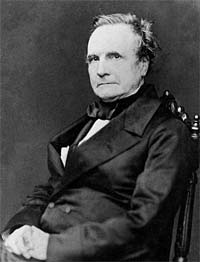Charles Babbage
Updated: 03/13/2021 by Computer Hope

Name: Charles Babbage
Born: December 26, 1791, in London, England
Death: October 18, 1871 (Age: 79)
Computer-related contributions
- Designed the first mechanical computer, which he called the "Difference Engine" — a machine that could solve polynomial equations without using multiplication or division. He began developing the machine in 1822, and worked on it for over ten years, but its construction was never completed.
- Invented and developed his Analytical Engine in the late 1830s. Like the Difference Engine, the Analytical Engine was never fully constructed, but its design was highly influential.
- His machine designs were the first to employ several concepts used in modern computers, including separating data and program memory, instruction-based operations, program control using conditional jumps, and a discrete unit for input/output. Because of this, today he is widely considered to be the father of computing.
Significant publications
- A Comparative View of the Various Institutions for the Assurance of Lives (1826).
- On the Economy of Machinery and Manufactures (1835).
- Table of the Logarithms of the Natural Numbers from 1 to 108000 (1841).
- Passages from the Life of a Philosopher (1864).
Quotes
"At each increase of knowledge, as well as on the contrivance of every new tool, human labour becomes abridged."
